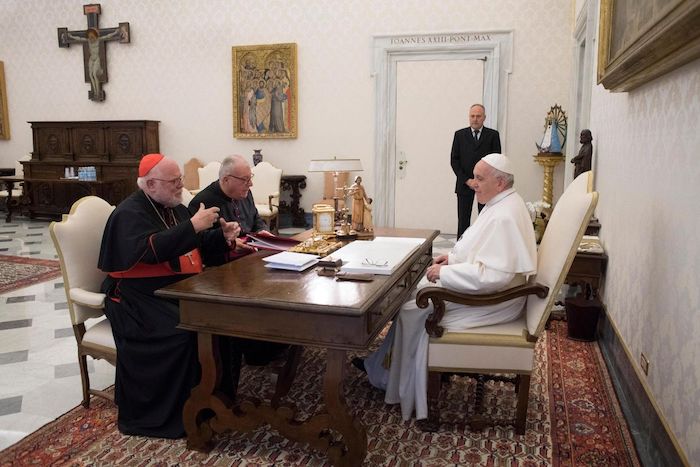Conservatives, particularly in the U.S., greet the prospect with alarm

By Francis X. Rocca
Germany’s Catholic bishops will meet in Frankfurt on Thursday to launch their most ambitious effort yet in their role as the church’s liberal vanguard: a two-year series of talks rethinking church teaching and practice on topics including homosexuality, priestly celibacy, and the ordination of women.
Conservatives in Germany and abroad are greeting the prospect with alarm, and nowhere more so than in the U.S., whose episcopate has emerged as the western world’s foremost resistance to progressive trends under Pope Francis.
The tension between the groups epitomizes significant divisions in the church, which some warn could lead to a permanent split.
Earlier in January, a group of conservative Catholics from various countries, including Archbishop Carlo Maria Viganò, a former Vatican envoy to the U.S. who has become one of the pope’s harshest critics, gathered in Munich to warn that the German initiative would result in “the constitution of a church separate from Rome.”
The event starting this week originated as a response to the scandal over sex abuse of minors by Catholic priests. A 2018 report on the crisis in Germany called for a more positive attitude to homosexuality and more attention to the challenge of celibacy. Catholic women’s groups later prevailed on the gathering to also address the question of gender equity in the church’s leadership.
The decline of the Catholic Church in Germany has accelerated amid the scandals and growing secularization. According to the church’s latest statistics, 216,078 people left the church in 2018—a leap of 29% from the previous year. A poll published in January by the Forsa Institute showed that only 14% of Germans trusted the Catholic Church, down from 18% the previous year. Trust in Pope Francis fell to 29% from 34%.
However, the church in Germany is prospering as never before in material terms, receiving a record €6.6 billion ($7.3 billion) through a state-collected tax in 2018. German bishops are among the biggest financial supporters of the Vatican and of Catholic institutions in the developing world.
German bishops have enjoyed rising influence under Pope Francis, reflected in his policies of greater leniency on divorce and more autonomy for local church authorities on matters such as liturgy—moves long advocated by German theologians.
The leaders of the German synod, which will include representatives of Catholic laypeople, say they are offering it as a model for the church at large.
Ludwig Ring-Eifel, head of the German bishops’ news agency, estimates that around two thirds of the bishops—the threshold for passing a resolution—support the ordination of married men and women deacons and half are in favor of blessings for same-sex unions.
American conservatives say that for a branch of the church even to consider such moves poses a threat to unity.
“The German bishops continue move toward #schism from the universal Church,” Archbishop Samuel Aquila of Denver said on Twitter in September.
A minority of German bishops share such fears—and look to the U.S. for support. Cardinal Rainer Maria Woelki of Cologne, leader of the German conservatives, traveled last summer to the U.S., where he visited various church institutions and met with some of his most prominent American counterparts.
“Everywhere, I encountered concern about the current developments in Germany,” the cardinal later told his diocesan newspaper. “In many meetings, the worry was tangible that the ’synodal path’ is leading us on a German special path, that in the worst case we could even put communion with the universal church at risk and become a German national church.”
Pope Francis himself has cautioned the Germans not to stray too far.
“Every time an ecclesial community has tried to get out of its problems alone, relying solely on its own strengths, methods and intelligence, it has ended up multiplying and nurturing the evils it wanted to overcome,” the pope said in an open letter to German Catholics in June.
But after meeting with the pope and Vatican officials in September, Cardinal Reinhard Marx of Munich, chairman of the German bishops conference, said: “There are no stop signs from Rome.”
In fact, when Pope Francis has publicly entertained the possibility of a split in the church, it has been in regards to the U.S., not Germany.
“There is always the option for schism,” the pope said in September, in response to a reporter’s question about conservative American opposition to his agenda. “I pray that schisms do not happen, but I am not afraid of them.”
That lack of fear could be because only the pope can decide whether or not a state of schism even exists, said Adam DeVille, a professor of theology at Indiana’s University of Saint Francis.
“If things get too far out of hand one way or another, I can see him acting in extreme but selective cases,” to stop any separatist moves, Mr. DeVille said.
“All it would take would be the sudden forced ‘retirement’ of a couple especially outspoken or perceived troublemakers, in Germany or anywhere else, for the others to shut up, and fall docilely in line,” he added.
Complete Article ↪HERE↩!

